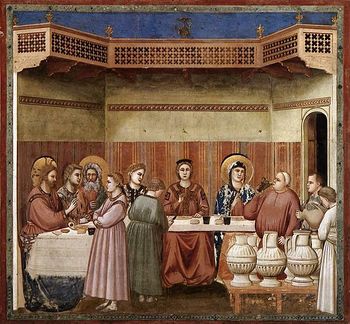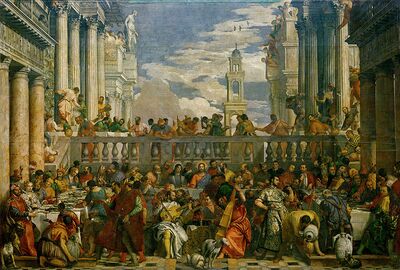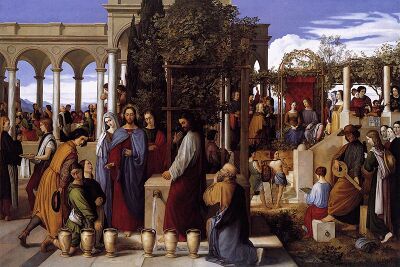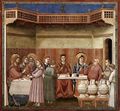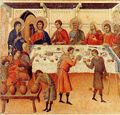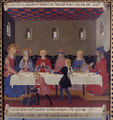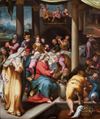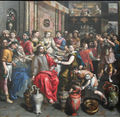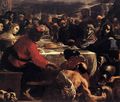Difference between revisions of "Category:Wedding at Cana (subject)"
| Line 47: | Line 47: | ||
v. 10- The head waiter's remark is neither a proverb nor a rule; it is simply a shrewd observation on human behavior. (Following Beasley-Murray ad loc). | v. 10- The head waiter's remark is neither a proverb nor a rule; it is simply a shrewd observation on human behavior. (Following Beasley-Murray ad loc). | ||
== Cf. [[Gospel of Barnabas]] == | |||
[15] When the feast of tabernacles was nigh, a certain rich man invited Jesus with his disciples and his mother to a marriage. Jesus therefore went, and as they were feasting the wine ran short. His mother accosted Jesus, saying: 'They have no wine.' Jesus answered: 'What is that to me, mother mine?' His mother commanded the servants that whatever Jesus should command them they should obey. There were there six vessels for water according to the custom of Israel to purify themselves for prayer. Jesus said: 'Fill these vessels with water.' The servants did so. Jesus said unto them: 'In the name of God, give to drink unto them that are feasting.' The servants thereupon bare unto the master of the ceremonies, who rebuked the attendants saying: 'O worthless servants, why have ye kept the better wine till now?' For he knew nothing of all that Jesus had done. | |||
The servants answered: 'O sir, there is here a holy man of God, for he hath made of water, wine.' The master of the ceremonies thought that the servants were drunken; but they that were sitting near to Jesus, having seen the whole matter, rose from the table and paid him reverence, saying: 'Verily thou art an holy one of God, a true prophet sent to us from God!' | |||
Then his disciples believed on him, and many returned to their heart, saying: 'Praised be God, who hath mercy upon Israel, and visited the house of Judah with love, and blessed be his holy name. | |||
==Wedding at Cana, in the arts== | ==Wedding at Cana, in the arts== | ||
Revision as of 18:01, 25 August 2022
The Wedding of Cana refers to an episode in the lives of Jesus of Nazareth and Mary of Nazareth. The episode is narrated only in the Gospel of John (2:1-11).
< Life of Jesus : Nativity of Jesus -- Jesus' Hidden Years -- Ministry of Jesus (Parables of Jesus, Miracles of Jesus) -- Passion of Jesus -- Resurrection of Jesus -- Relics of Jesus >
< Life of Mary of Nazareth : Expulsion of Joachim from the Temple -- Annunciation to Anne and Joachim -- Birth of Mary -- Girlhood of Mary (Education of the Virgin, Presentation of Mary at the Temple) -- Marriage of Mary and Joseph -- Annunciation to Mary -- Visitation of Mary -- Birth of Jesus -- Adoration of the Shepherds -- Adoration of the Magi -- Circumcision of Jesus -- Presentation of Jesus at the Temple -- Massacre of the Innocents -- Flight into Egypt -- Jesus among the Doctors -- Death of Joseph of Nazareth -- Wedding at Cana -- Jesus' True Relatives -- Hometown Rejection -- Crucifixion of Jesus -- Resurrection of Jesus -- Ascension of Jesus -- Gathering of the Twelve at Jerusalem -- Christian Pentecost -- Death and Assumption of Mary -- Relics of Mary of Nazareth >
- This page is edited by James E. West, Quartz Hill School of Theology, United States of America.
Overview
According to the Gospel of John, the Wedding at Cana was the 'first of Jesus' miracles.' The only Gospel to record this miracle is John and it is never referenced elsewhere in the New Testament at all. This suggests that the story had a particular significance to the author of the Gospel of John.
The miracle itself consists of the filling of six large water jars with water and those jars then being delivered to the 'head-waiter' of the marriage celebration where he announces that he has never had such excellent wine. There is no explicit mention of Jesus changing the water into wine. There is only the suggestion that he had done so.
In terms of the meaning of the event, the jars used were large purification jars, made of stone, and each containing a fairly substantial sum of water. If 6 large purification jars were at hand, and were filled with water, a huge crowd could have been rendered ritually pure since, according to Rabbinic tradition (admittedly later than the first century) the amount of water required for purification was, in volume, the amount that would fit in an egg (or about an ounce to an ounce and a half). Six large jars each holding 20-30 gallons of water could thus provide purification for a countless multitude.
When the water for purification was changed to wine, John simply implies that Jesus will provide purification for all comers (by his blood, represented, naturally, by that wine).
Wedding at Cana, in ancient sources
Gospel of John
John 2:1-11 (NRSV) -- [1] On the third day there was a wedding in Cana of Galilee, and the mother of Jesus was there. 2 Jesus and his disciples had also been invited to the wedding. 3 When the wine gave out, the mother of Jesus said to him, "They have no wine." 4 And Jesus said to her, "Woman, what concern is that to you and to me? My hour has not yet come." 5 His mother said to the servants, "Do whatever he tells you." 6 Now standing there were six stone water jars for the Jewish rites of purification, each holding twenty or thirty gallons. 7 Jesus said to them, "Fill the jars with water." And they filled them up to the brim. 8 He said to them, "Now draw some out, and take it to the chief steward." So they took it. 9 When the steward tasted the water that had become wine, and did not know where it came from (though the servants who had drawn the water knew), the steward called the bridegroom 10 and said to him, "Everyone serves the good wine first, and then the inferior wine after the guests have become drunk. But you have kept the good wine until now." 11 Jesus did this, the first of his signs, in Cana of Galilee, and revealed his glory; and his disciples believed in him.
Notes:
v. 1- Many have offered varying interpretations concerning the significance of 'the third day'. Here John probably simply has in mind the fact that a 'few days' after 1:50-51 was uttered, it was fulfilled.
Cana is specified because there were, in fact, two Cana's in Israel. One in Galilee, and another in Samaria.
vv. 2-3 - George Beasley-Murray (John, Word Biblical Commentary, Vol 36, p. 34) remarks here '[Jesus] presence with his disciples, jointly embarked on a mendicant ministry which rendered them unable to fulfill the obligation of guests, contributed to the embarrassing situation'.
v. 4 - τι εμοι και σοι exists in Syriac and is understood to mean 'I'm with you on this'. Hence, rather than being a confrontational statement or a derogatory remark to Jesus' mother, it is simply a statement of agreement.
v. 5 - The mother of Jesus is never named in the Gospel of John. Were it not for the other gospels, we wouldn't have any indication of her name at all. This is, it must be admitted, quite a remarkable fact. John's failure to mention Mary has provoked a large number of essays and investigations.
v. 6 - Again, Beasley-Murry is doubtless correct when he states '... the great quantity they contained reflected the fullness of Christ's grace, in contrast to the limitations of the old covenant' (Ibid., p. 35).
v. 10- The head waiter's remark is neither a proverb nor a rule; it is simply a shrewd observation on human behavior. (Following Beasley-Murray ad loc).
Cf. Gospel of Barnabas
[15] When the feast of tabernacles was nigh, a certain rich man invited Jesus with his disciples and his mother to a marriage. Jesus therefore went, and as they were feasting the wine ran short. His mother accosted Jesus, saying: 'They have no wine.' Jesus answered: 'What is that to me, mother mine?' His mother commanded the servants that whatever Jesus should command them they should obey. There were there six vessels for water according to the custom of Israel to purify themselves for prayer. Jesus said: 'Fill these vessels with water.' The servants did so. Jesus said unto them: 'In the name of God, give to drink unto them that are feasting.' The servants thereupon bare unto the master of the ceremonies, who rebuked the attendants saying: 'O worthless servants, why have ye kept the better wine till now?' For he knew nothing of all that Jesus had done.
The servants answered: 'O sir, there is here a holy man of God, for he hath made of water, wine.' The master of the ceremonies thought that the servants were drunken; but they that were sitting near to Jesus, having seen the whole matter, rose from the table and paid him reverence, saying: 'Verily thou art an holy one of God, a true prophet sent to us from God!'
Then his disciples believed on him, and many returned to their heart, saying: 'Praised be God, who hath mercy upon Israel, and visited the house of Judah with love, and blessed be his holy name.
Wedding at Cana, in the arts
- Wedding Cana Pacher.jpg
- Wedding Cana Giordano.jpg
- Wedding Cana Panini.jpg
- Wedding Cana Platzer.jpg
Geography and Memorials
The exact location of the narrative is unknown. There are different sites in Galilee that might be identified with the ancient Cana. A church at the town of Kafr Kanna marks the place that many Christians traditionally refer to as the location of the wedding.
External links
Pages in category "Wedding at Cana (subject)"
The following 17 pages are in this category, out of 17 total.
1
- Wedding at Cana (1306 Giotto), art
- Wedding at Cana (1311 Duccio), art
- Wedding at Cana (1452 Angelico), art
- Wedding at Cana (1500 David), art
- Marriage Feast at Cana (1516 Bosch), art
- Wedding at Cana (1561 Tintoretto), art
- Wedding at Cana (1563 Veronese), art
- Wedding at Cana (1566 Vasari), art
- Wedding at Cana (1592 Calvaert), art
- Wedding at Cana (1597 Vos), art
- Wedding at Cana (1620 Manetti), art
- Wedding at Cana (1655 Preti), art
- Marriage Feast at Cana (1675 Murillo), art
- Wedding at Cana (1775 Gandolfi), art
- Wedding at Cana (1819 Schnorr), art
- Wedding at Cana (1906 Schnell), art
